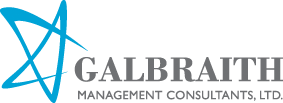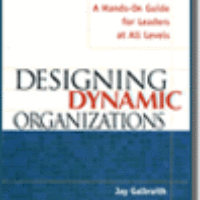Designing Dynamic Organizations: A Hands-On Guide for Leaders at All Levels
Designing Dynamic Organizations emerged from frequent requests by middle and senior managers for a workbook – with tools – to help them design their organizations.
This book was written for those who lead an organization and want to be sure that it is aligned to achieve their business strategy.
This book will help you to:
- Make choices about which organizational forms will best support your business strategy.
- Understand the trade-offs and impact of each design decision.
- Introduce flexibility and continuous change without losing the clarity that employees need to function effectively.
The book draws on the extensive consulting experience of Jay Galbraith with his clients around the world, as well as the in-depth work that Diane Downey and Amy Kates have conducted with their clients in organization assessment, design and implementation. The book is written from a practical, consulting-based approach and provides several tools and exercises to aid the manager in assessing options and making design decisions. It was developed to complement the comprehensive theories discussed in Jay Galbraith’s book, Designing Organizations.
“Designing Dynamic Organizations is a veritable survival guide for organizations coping with the demands of uncertain and volatile markets that force businesses to quickly adapt their work processes and structures, and leverage human capital. The authors translate rigorous theories and models into practical step-by-step approaches that can be quickly absorbed and utilized by teams at all levels of the organization.”
— Nancy Bologna, Ph.D., Senior Vice President, Best Buy Company, Inc.
“This book offers a comprehensive and easy-to-use approach for creating high-impact organizations in uncertain times. The authors have successfully taken the complexity out of designing complex organizations.”
— Dennis Shiel, Vice President, Human Resources, MetLife
“Galbraith, Downey and Kates have done something delightfully different from the typical treatise on organization design. this book is all about practical tools and instruments, options, and how-to’s. A real find for today’s business practitioner.”
— Reihnart Helmke, Executive Director, UN Office for Project Services.
| Getting Started | |
| Organization Design | |
| The Reconfigurable Organization | |
| Deciding When to Redesign | |
| The Design Process | |
| The Case for a Participative Process | |
| 2. | Determining the Design Framework |
| Translating the Strategy Into Design Criteria | |
| Clarifying Limits and Assumptions | |
| Assessing the Current State | |
| 3. | Designing the Structure |
| Structural Concepts | |
| Organizational Roles | |
| Leadership Roles | |
| Testing the Design | |
| Using a Participative Process: Mapping the Structure | |
| Design and Implementation Governance: Working Through the Details | |
| 4. | Processes and Lateral Capability |
| Lateral Capability | |
| Networks | |
| Lateral Processes | |
| Teams | |
| Integrative Roles | |
| Matrix Structures | |
| Building Lateral Capability | |
| 5. | Defining and Rewarding Success |
| Metrics | |
| Values and Behaviors | |
| Compensation | |
| Rewards and Recognition | |
| 6. | People Practices |
| Staffing the New Organization | |
| Assessing for Learning Aptitude | |
| Performance Feedback | |
| From Training to Learning | |
| 7. | Implementation |
| Planning | |
| Managing Skepticism | |
| Assimilating Into the Organization |

